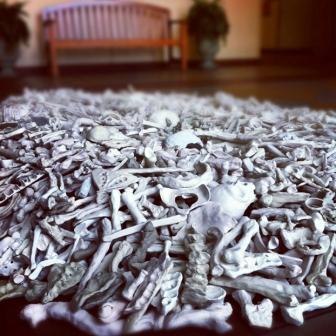Combining education and community engagement

On Tuesday, June 12th students in the College of Social Work created an installation of approximately 4,000 clay bones in the College’s lobby. Students, faculty, staff, and onlookers assembled the bones and congregated to discuss the meaning and significance of the clay bones and the importance of these installations as visual way to combat genocide and mass violence. Participants were also able to make clay bones, each bone raising a dollar to support survivors of mass violence.
Following the event, Dean Nick Mazza met with One Million Bones Tallahassee’s coordinator Jane McPherson and her BSW-level community practice students to facilitate a poetry response to the installation and class experience of the One Million Bones Project. The class participated extensively with One Million Boens activities and events during the summer semester making bones, organizing events, recruiting participants and creating the installation. The group created three different types of poems to express their impressions and experiences.
The first poem created, a “group poem,” emerged as students shared their experiences running events and trying to recruit passersby to stop and learn about mass violence, make bones out of clay and help raise money for survivors in Congo and Somalia. Each line is the contribution of an individual, but as the poem grew the additional lines were chosen by consensus until the poem was complete.
Group Poem
I saw a glimpse of hope in the eyes of people as they walked by
Hmm. Do they really understand?
Do I see hope, or are they just humoring me?
Can they see the pile of bones?
How can I make them understand?
Bones with no names,
Worn smooth by tears.
Stories lost, now our own.
So many people still don’t care.
Rushing by?
Do I look as naïve as I feel?

The second poem was a renku, a Japanese poetry form calling for three stanzas. The first and final stanzas consisted of five, seven and five syllables, while the middle stanza consists of two lines of seven syllables each. Individual students were invited to call out lines until the group agreed that the poem was complete.
Renku Poem
The clink of fired clay:
How many bones will it take?
Arms, legs, ribs, fingers.
How many days will it be
Before these people find peace?
Loss, anger, pain, tears.
Will they get a proper place?
Will we change the world.
The final form of poetry Dean Mazza introduced to the class was the “six-word novel.”
Six-Word Novels
Infinite amounts of bones lying there.
Clay bones represent real human loss.
Participating writers: Chris Burney, Marlena Caporice , Chelsea Fox, Agnes Furey, Kristin Goff, Andrea Hollingsworth, Jon Jefferson, Nick Mazza, Jane McPherson, Monica Rupchis, Khadija Waldron, Denitra Washington
**Do not print, reproduce or reuse without written permission of the College of Social Work.
